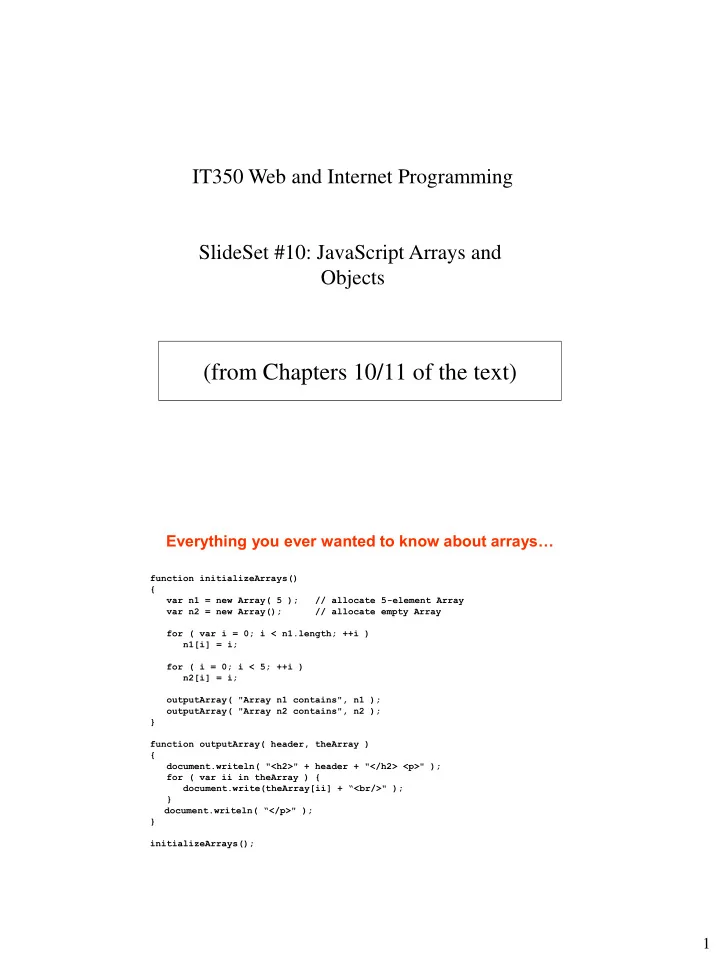

IT350 Web and Internet Programming SlideSet #10: JavaScript Arrays and Objects (from Chapters 10/11 of the text) Everything you ever wanted to know about arrays… function initializeArrays() { var n1 = new Array( 5 ); // allocate 5-element Array var n2 = new Array(); // allocate empty Array for ( var i = 0; i < n1.length; ++i ) n1[i] = i; for ( i = 0; i < 5; ++i ) n2[i] = i; outputArray( "Array n1 contains", n1 ); outputArray( "Array n2 contains", n2 ); } function outputArray( header, theArray ) { document.writeln( "<h2>" + header + "</h2> <p>" ); for ( var ii in theArray ) { document.write(theArray[ii] + “<br/>" ); } document.writeln( “</p>" ); } initializeArrays(); 1
…but were afraid to ask. Scope – Revisited function mystery( x, y ) { for ( var ii = 0; ii < x.length; ++ii ) x[ii] = x[ii] * y; y = 7; document.writeln("<br/> x: ",x); document.writeln("<br/> y: ",y); } var myArray = [3, 4, 5]; var factor = 2; document.writeln ("<br/> myArray: ", myArray); mystery(myArray, factor); document.writeln ("<br/> myArray: ", myArray); document.writeln ("<br/> factor : ", factor); Arguments are passed ______________, so original argument values in caller are ________________ BUT array/object arguments are a “reference”, so contents may be ___________ 2
Exercise #1 a.) Write a function “sumArray” as follows: Input: an array Output: the sum of that array b.) Write test code to create an array and call “sumArray” on it. Exercise #2 – What’s the output? function printme( z ) { document.writeln("<br/> z is ",z); } var array1 = [17, 21, 42]; var array2 = [14, 19]; var x = 1; printme (array1); printme (array2[1]); printme (x); array1[x] = 57; printme (array1); 3
Exercise #3 – What’s the output? (Hint: assume JavaScript ignores any errors it finds) function changeMe1( z ) { z[0] = 75; } function changeMe2( a, b) { a = b; } var array1 = [17, 21, 42]; var array2 = [14, 19]; var array3 = [7, 8, 9]; var x = 63; changeMe1 (array1); document.writeln("<br/> array1: ", array1); changeMe1 (x); document.writeln("<br/> x: ", x); array1 = array2; document.writeln("<br/> array1: ", array1); changeMe2 (array1, array3); document.writeln("<br/> array1: ", array1); Exercise #4 • Write a function perfect(N) that returns an array of size N containing the first N perfect squares. So perfect(4) would return [0, 1, 4, 9]. 4
Exercise #5 Write a function dotProduct(x, y) that takes two arrays of size n and returns the sum: x[0]*y[0] + x[1]*y[1] + … + x[n -1]*y[n-1] Functions as Arguments function start() { var a = [ 10, 1, 9, 2, 8, 3, 7, 4, 6, 5 ]; document.writeln( "<h1>Sorting an Array</h1>" ); document.writeln( "Data items in original order: ", a ); // sort the array using the order provided by function a.sort( compareIntegers ); document.writeln( "Data items in ascending order: ", a ); } // comparison function for use with sort //returns <0 if value1 < value2 // 0 if value1 == value2 // >0 if value1 > value2 function compareIntegers( value1, value2 ) { return parseInt( value1 ) - parseInt( value2 ); } 5
Sorting Output document Object Method or property Description getElementById( id ) Returns the DOM node representing the XHTML element whose id attribute matches id . write( string ) Writes the string to the XHTML document as XHTML code. writeln( string ) Writes the string to the XHTML document as XHTML code and adds a newline character at the end. cookie A string containing the values of all the cookies stored on the user’s computer for the current document. See Section 11.9, Using Cookies. lastModified The date and time that this document was last modified. 6
How can we use getElementById? How can we use getElementById? <!DOCTYPE html> <html> <head> <title>DHTML</title> <script type = "text/javascript"> function changeInput(){ var myEl = document.getElementById("ammount"); myEl.value = 10; } </script> </head> <body> <form action="" > <h1> Testing assigning values at runtime</h1> <input type = "text" name = "amount" id = "ammount" /> <br /> <input type = "button" value = "Make it 10!" onclick = "changeInput()" /> </form> </body> </html> 7
window Object Method or property Description open( Creates a new window with the URL of the window set url , name , options ) to url , the name set to name to refer to it in the script, and the visible features set by the string passed in as option. prompt( Displays a dialog box asking the user for input. The text prompt , default ) of the dialog is prompt , and the default value is set to default. close() Closes the current window and deletes its object from memory. focus() This method gives focus to the window (i.e., puts the window in the foreground, on top of any other open browser windows). blur() This method takes focus away from the window (i.e., puts the window in the background). window.document This property contains the document object representing the document currently inside the window. window.closed This property contains a boolean value that is set to true if the window is closed, and false if it is not. window.opener This property contains the window object of the window that opened the current window, if such a window exists. 8
Recommend
More recommend